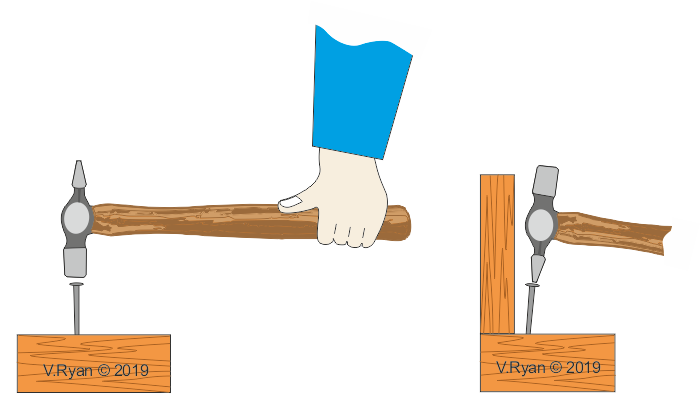A Cross Pein Pin Hammer features a flat face and a wedge-shaped pein. It’s used for shaping metal and starting nails.
The Cross Pein Pin Hammer is a versatile tool in both woodworking and metalworking. Its unique design allows craftsmen to drive nails into hard-to-reach areas and to create precise shapes in metal. The flat face is ideal for general hammering, while the wedge-shaped pein is perfect for spreading and shaping metal surfaces.
This hammer is especially useful in tasks requiring detailed work, such as jewelry making or intricate metal sculptures. Its ergonomic handle ensures a comfortable grip, reducing hand fatigue during prolonged use. Every workshop benefits from having a Cross Pein Pin Hammer on hand.

Credit: en.wikipedia.org
Introduction To Cross Pein Pin Hammer
The Cross Pein Pin Hammer is a special tool for metalworking and woodworking. This hammer is known for its unique design and usefulness. Let’s explore its origins, design, and structure.
Origins And History
The Cross Pein Pin Hammer has a rich history. It dates back to ancient metalworking times. Blacksmiths used it to shape metal. Over time, this hammer became essential for various trades.
| Era | Use |
|---|---|
| Ancient Times | Metal Shaping |
| Middle Ages | Woodworking |
| Modern Era | General Craftsmanship |
Design And Structure
The Cross Pein Pin Hammer has a unique design and structure. It features a flat striking face on one side. The other side has a wedge-shaped pein.
- Head: Made of hardened steel
- Handle: Usually wood or fiberglass
- Pein: Wedge-shaped for precision work
This hammer is perfect for tasks requiring precision. Its design allows for controlled, directed force. This makes it ideal for riveting and shaping metal.
Types Of Cross Pein Pin Hammers
Cross pein pin hammers come in various types. Each type suits different tasks. Understanding these types helps in choosing the right tool for your project.
Different Materials
Cross pein pin hammers are made from different materials. The choice of material impacts the hammer’s durability and use.
- Steel Hammers: These are the most common. They are strong and durable.
- Brass Hammers: These are softer than steel. They reduce the risk of damage to delicate surfaces.
- Wooden Hammers: These are lightweight. They are ideal for light tapping tasks.
Varied Sizes
Cross pein pin hammers come in varied sizes. The size affects how the hammer is used.
- Small Hammers: These are for detailed work. They are perfect for jewelry making.
- Medium Hammers: These are versatile. They are used in general carpentry.
- Large Hammers: These are for heavy-duty tasks. They are used in metalworking.
| Material | Use Case | Durability |
|---|---|---|
| Steel | General use | High |
| Brass | Delicate surfaces | Medium |
| Wood | Light tapping | Low |
Primary Uses
The Cross Pein Pin Hammer is a versatile tool. It is essential in both metalworking and woodworking. Its unique design makes it ideal for various tasks. Let’s explore its primary uses in detail.
Metalworking Applications
The Cross Pein Pin Hammer is crucial in metalworking. Its narrow pein allows for precise work. Metalworkers use it to create intricate details. Here are some common metalworking uses:
- Shaping and Bending: The pein helps bend metal sheets accurately.
- Riveting: Ideal for driving and setting rivets in metal.
- Texturing: Adds texture to metal surfaces for a unique finish.
Metalworkers often rely on this hammer for small, delicate tasks. Its balanced weight ensures controlled strikes.
Woodworking Uses
In woodworking, the Cross Pein Pin Hammer is equally valuable. It is perfect for tasks requiring precision. Woodworkers use it for various purposes. Some common woodworking uses include:
- Nailing: Ideal for driving small nails or pins.
- Carving: Helps in fine carving and detailing work.
- Assembling: Perfect for assembling small wooden parts.
This hammer’s design allows for delicate woodwork without damage. It ensures accuracy and control in every strike.
Choosing The Right Hammer
Choosing the right hammer is crucial for any DIY or professional task. A cross pein pin hammer is a versatile tool. It is used for shaping metal and wood. Let’s explore the factors to consider.
Factors To Consider
- Weight: Choose a hammer that is comfortable to hold.
- Handle Material: Wood, fiberglass, or steel handles each have benefits.
- Head Material: Steel heads are durable and long-lasting.
- Grip: Ensure the grip is non-slip and fits your hand well.
Each factor plays a role in your hammer’s effectiveness. The right balance and grip can prevent strain. A durable head ensures long-term use. Now, let’s look at some top brands and models.
Brands And Models
| Brand | Model | Features |
|---|---|---|
| Estwing | Cross Pein Hammer |
|
| Stanley | Pin Hammer |
|
| Hultafors | TC-16 |
|
These brands offer reliable and high-quality hammers. Consider these options for your next project. Remember, the right hammer can make all the difference.
Proper Techniques
Using a Cross Pein Pin Hammer correctly ensures safety and efficiency. This tool is crucial for metalworking, woodworking, and other precision tasks. Mastering proper techniques can greatly improve your work quality.
Grip And Stance
Proper grip and stance are essential for effective hammering. Hold the hammer firmly but not too tight. Your hand should be comfortable and relaxed.
Stand with your feet shoulder-width apart. This position provides balance and stability. Bend your knees slightly for better control. Keep your back straight to avoid strain.
Striking Methods
Use the Cross Pein Pin Hammer for accurate strikes. The cross pein side is perfect for starting nails or making precise marks. The flat side is ideal for driving nails or shaping metal.
Raise the hammer to shoulder height. Aim carefully at your target. Strike with a controlled motion, using your elbow and wrist. Avoid excessive force to prevent damage or injury.
- Light Taps: For starting nails or delicate work
- Medium Strikes: For general tasks
- Heavy Blows: For driving nails deep or shaping metal
Following these techniques ensures precision and safety. Practice regularly to improve your skills with the Cross Pein Pin Hammer.
Maintenance Tips
Maintaining your cross pein pin hammer ensures it lasts longer. Proper care helps it perform better. Below are some tips to help you maintain your hammer.
Cleaning And Storage
Always clean your hammer after use. Wipe it with a clean cloth. Remove any dirt or debris. Use a mild soap if needed. Dry it thoroughly to prevent rust.
Store your hammer in a dry place. Keep it away from moisture. Moisture can cause rust and damage. Use a tool rack or toolbox for safe storage. This keeps it organized and easy to find.
Inspecting For Damage
Inspect your hammer regularly for damage. Check the head and handle. Look for cracks or wear. A damaged hammer can be unsafe to use.
Replace the hammer if you find any damage. Do not use a broken hammer. It can cause accidents or injuries. Regular inspection keeps your hammer safe and effective.
Safety Precautions
Using a cross pein pin hammer can be very effective for specific tasks. But, you must follow safety precautions to avoid injuries. Below are some essential safety tips.
Protective Gear
Wearing the right protective gear is crucial. This includes:
- Safety goggles to protect your eyes from flying debris.
- Gloves to shield your hands from sharp objects.
- Ear protection if you’re working in a noisy environment.
Safe Work Environment
A safe work environment is vital for using a cross pein pin hammer. Consider the following tips:
| Safety Tips | Description |
|---|---|
| Clear Workspace | Ensure your area is free from clutter. |
| Good Lighting | Work in a well-lit area to see clearly. |
| Stable Surface | Always work on a stable surface to avoid accidents. |
Following these safety precautions can make your work more efficient and safe.
Common Mistakes
Understanding the proper use of a Cross Pein Pin Hammer is crucial. Many users make common mistakes that can lead to accidents or tool damage. Knowing these errors and how to avoid them can extend the life of your hammer and improve your work quality.
Avoiding Misuse
Misuse of a Cross Pein Pin Hammer is a frequent issue. Many people use it for tasks it’s not designed for. This includes using it as a pry bar or striking metal surfaces. These actions can damage the hammer and hurt the user.
Only use the hammer for its intended purpose. It’s designed for shaping metal and driving nails. Using it correctly ensures safety and efficiency.
Recognizing Wear And Tear
Regular inspection of your Cross Pein Pin Hammer is essential. Wear and tear can affect its performance and safety. Look for cracks in the handle or head. A loose handle can cause the head to fly off during use.
Check for any deformities in the hammerhead. A deformed head can lead to inaccurate strikes and potential injuries.
Here is a table to help you identify common signs of wear and tear:
| Sign of Wear | Action Needed |
|---|---|
| Cracked Handle | Replace the handle immediately |
| Loose Head | Tighten or replace the head |
| Deformed Hammerhead | Reshape or replace the head |
Advanced Tips And Tricks
Welcome to the advanced tips and tricks for using the Cross Pein Pin Hammer. This tool, while simple, can be incredibly versatile. Learn these expert techniques to elevate your skills and efficiency.
Expert Techniques
Mastering the Cross Pein Pin Hammer requires some specific techniques. The following tips can help you become more proficient:
- Proper Grip: Hold the hammer near the end of the handle for better control.
- Angle Management: Use the pein side at a 45-degree angle for precision.
- Steady Pace: Maintain a consistent, rhythmic striking motion.
Practice these techniques to improve your hammering efficiency.
Enhancing Efficiency
Efficiency is key when using a Cross Pein Pin Hammer. These tips can help you work smarter:
- Tool Maintenance: Keep the hammerhead clean and rust-free for better performance.
- Work Area Organization: Keep your workspace tidy to avoid distractions.
- Use a Bench Vise: Secure your workpiece with a bench vise for stability.
Follow these steps to enhance your efficiency and get better results.
| Tip | Benefit |
|---|---|
| Proper Grip | Better control |
| Angle Management | Precision |
| Steady Pace | Consistent results |
| Tool Maintenance | Improved performance |
| Work Area Organization | Fewer distractions |
| Use a Bench Vise | Increased stability |

Credit: www.reddit.com

Credit: technologystudent.com
Frequently Asked Questions
What Is A Cross Pein Pin Hammer?
A Cross Pein Pin Hammer is a small, lightweight hammer with a horizontal pein opposite the flat striking face.
How Is A Cross Pein Pin Hammer Used?
It is commonly used for metalworking, woodworking, and riveting, providing precise control and accuracy.
Why Choose A Cross Pein Pin Hammer?
This hammer offers excellent balance and precision, making it ideal for detailed tasks and delicate projects.
Can You Use It For Woodworking?
Yes, it is perfect for small woodworking projects, especially when accuracy and control are essential.
What Materials Can It Work With?
It works well with metal, wood, and even soft materials, making it versatile for various crafts and repairs.
Conclusion
A Cross Pein Pin Hammer is versatile and essential for many tasks. It aids in metalwork, woodworking, and general repairs. Its unique design offers precision and control. Investing in a quality Cross Pein Pin Hammer can enhance your toolkit. Understanding its uses ensures you get the most out of this handy tool.
